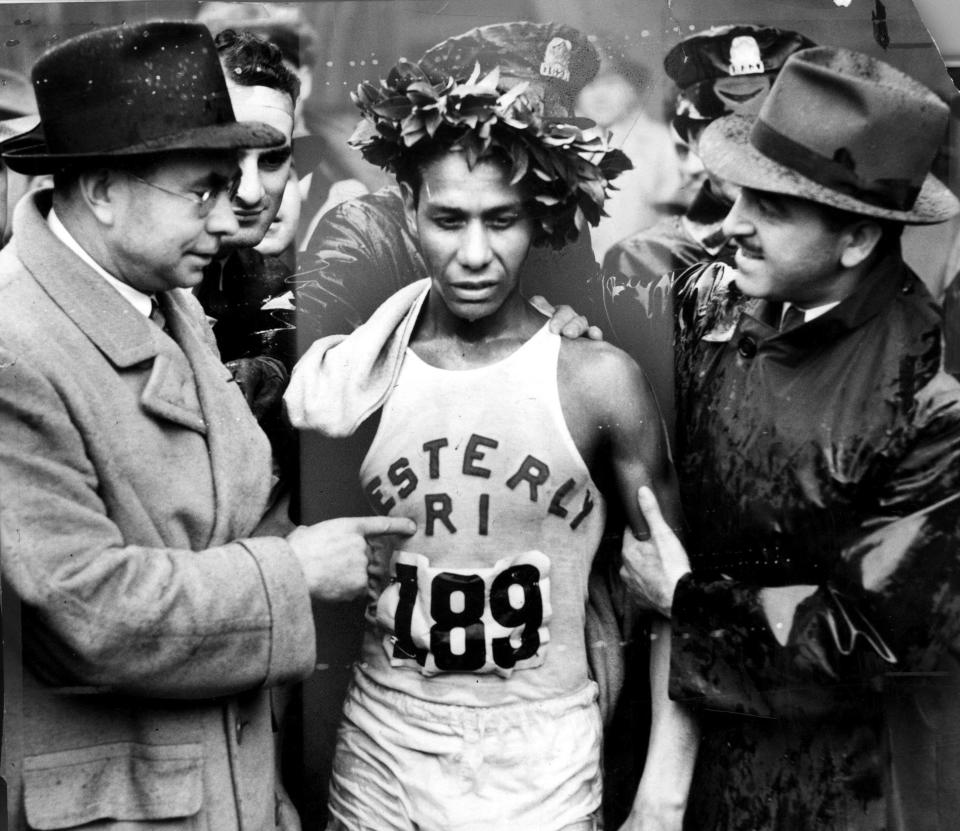Native Americans who had an impact on RI. Here are 9 in the Hall of Fame | Opinion
- Oops!Something went wrong.Please try again later.
Ken Dooley, publisher, producer and writer, was inducted into the Rhode Island Heritage Hall of Fame in 2018. He also served as a director on the Board of Directors.
“As an Indigenous woman from Texas, the only history I learned about my people in school revolved around their erasure.” Sofia Barnett wrote those words in her excellent opinion piece in The Providence Journal (Commentary, August 12) pointing out that Indigenous history is not taught well in Texas schools.
Thanks primarily to Patrick T. Conley, historian laureate of Rhode Island, students can go on the website of the Rhode Island Heritage Hall of Fame, click the category “Native Americans,” and read the history of some of the prominent Native Americans who have been inducted into the Hall of Fame. Conley served as chairman of the Historian Committee when most were inducted.
Honorees include:
Chief Massasoit, also known as Ousamequin, inducted in 2007, was born in what is present-day Rhode Island. As chief sachem of the Wampanoag nation, he befriended the Pilgrims at Plymouth, taught them farming methods, and joined with them in a Thanksgiving feast in 1621.
Massasoit Metacomet, inducted in 1997, was also known as King Philip. He tried to preserve his own civilization and his people’s autonomy in the face of overwhelming odds. In the early 1670s, 50 years of peace between Plymouth colony and the Wampanoags deteriorated, resulting in war between the Indians and colonists. The war ended Native American dominance in the region and inaugurated a period of colonial expansion.
More: Narragansett Tribe seeks sovereignty, others want recognition. The debate is impassioned
Miantonomi and Canonicus, inducted in 1997, were sachems of the Narragansett Tribe who obtained their dominance through persuasion rather than violence. In 1638, Canonicus and his nephew Miantonomi deeded Roger Williams land that became Providence.
Christiana Carteaux Bannister, inducted in 2003, was born Christiana Babcock in Washington County sometime between 1820 and 1822, Details concerning her birth and background are obscure, but she appears to have been of mixed Native American and African American parentage. She married Canadian-born Edward Bannister, one of America’s most successful Black artists. The Bannisters worked with Lewis Hayden in the operation of Boston’s Underground Railroad, assisting runaway slaves. After the Civil War, the Bannisters moved to Providence, where Christiana became deeply involved in improving the lives of African American women.
More: Town of Warren officially recognizes Pokanoket ties to land
Princess Red Wing, also known as Mary E. (Glasko) Congdon, was a Narragansett and Wampanoag elder, historian, folklorist and museum curator, inducted in 1978. She was an expert on American Indian history and culture, and she once addressed the United Nations. Red Wing was the co-founder and editor of The Narragansett Dawn tribal newspaper, which was published from 1935 to 1936. She became "Squaw Sachem" of the New England Council of Chiefs in 1945, a position which allowed her to preside over sacred ceremonies and festivals. She was also a prominent storyteller in the Narragansett community, keeping alive the oral traditions of her tribe. She preserved their history by co-founding the Tomaquag Indian Memorial Museum.
Ninigret, inducted in 2018, was a sachem of the eastern Niantic tribe based in Rhode Island. In 1637, he allied with the colonists and the Narragansetts against the Pequot Indians. Ninigret is credited with keeping the Niantics out of King Philip's War, in which the colonists fought to prevent their homes and settlements from being destroyed by certain Indian tribes.

Wilfred “Eagle Heart” Greene was inducted in 2022. He entered the sport of professional boxing and became the New England middleweight champion and the seventh middleweight in the world.
Ellison M. “Tarzan” Brown, inducted in 1968, was a member of the Narragansett tribe who came from the Richmond village of Alton. He became a world-class marathoner in the 1930s, winning the Boston Marathon in 1939 with an Olympic-breaking time.
The Rhode Island Heritage Hall of Fame is located, appropriately, on the Wampanoag Trail in East Providence.
This article originally appeared on The Providence Journal: Contributors include Chief Massasoit and marathon legend Ellison "Tarzan" Brown.

